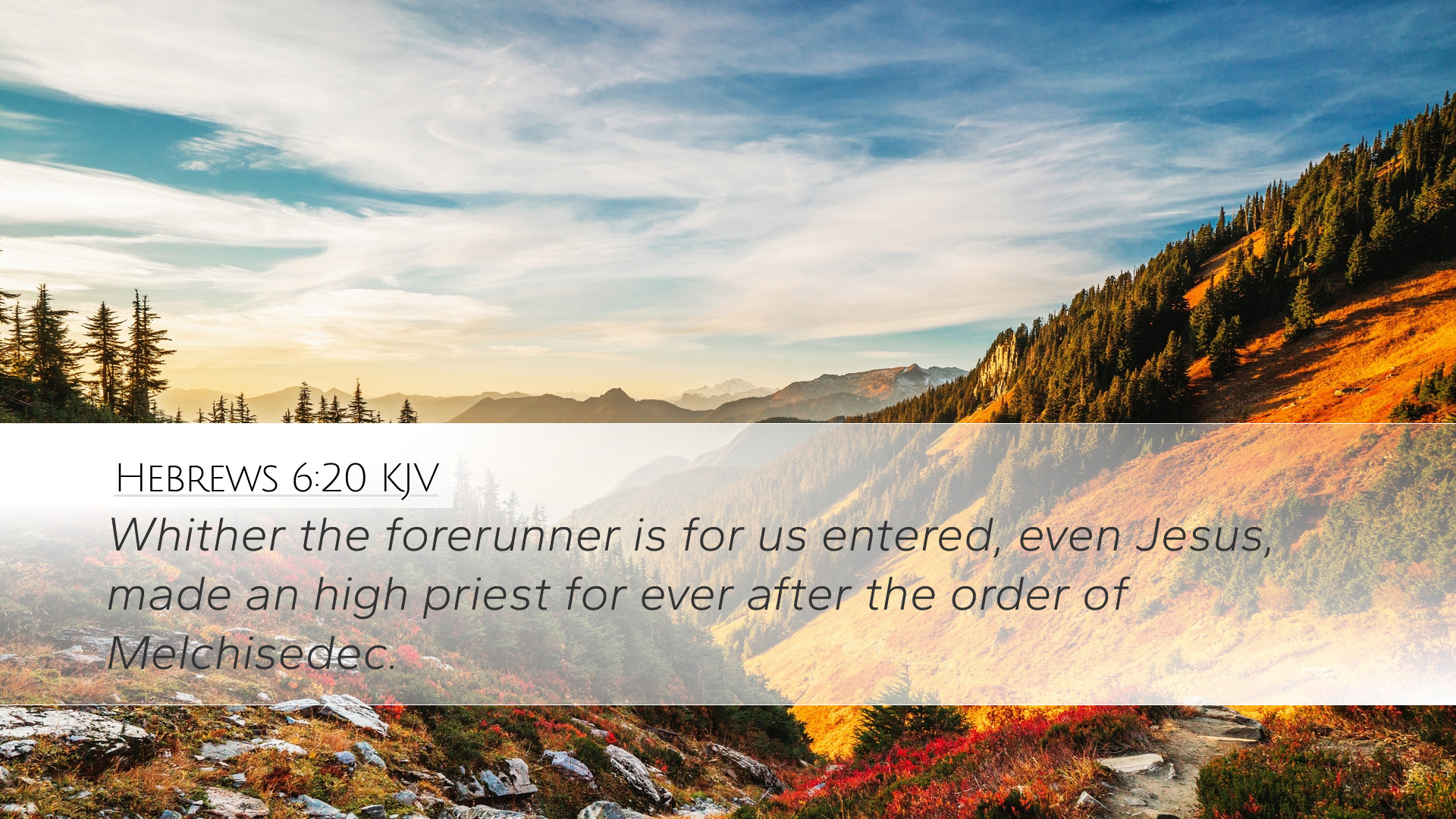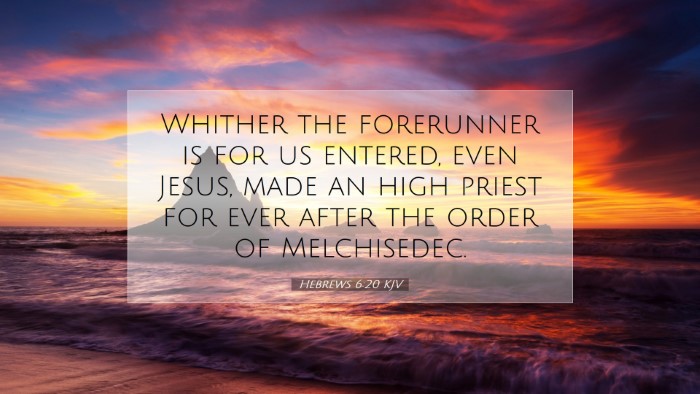Old Testament
Genesis Exodus Leviticus Numbers Deuteronomy Joshua Judges Ruth 1 Samuel 2 Samuel 1 Kings 2 Kings 1 Chronicles 2 Chronicles Ezra Nehemiah Esther Job Psalms Proverbs Ecclesiastes Song of Solomon Isaiah Jeremiah Lamentations Ezekiel Daniel Hosea Joel Amos Obadiah Jonah Micah Nahum Habakkuk Zephaniah Haggai Zechariah MalachiHebrews 6:20
Hebrews 6:20 KJV
Whither the forerunner is for us entered, even Jesus, made an high priest for ever after the order of Melchisedec.
Hebrews 6:20 Bible Commentary
Commentary on Hebrews 6:20
Hebrews 6:20 states, "Where Jesus has entered as a forerunner for us, having become a high priest forever according to the order of Melchizedek." This verse plays a crucial role in the theological understanding of Christ's priesthood and His role as a mediator between God and humanity.
Contextual Overview
To appreciate the significance of Hebrews 6:20, it is essential to consider its context within the epistle. The book of Hebrews is addressed to Jewish Christians who were facing persecution and were in danger of reverting to Judaism. The author emphasizes the superiority of Christ over the old covenant and its priesthood, highlighting Jesus as the fulfillment of Old Testament types and shadows.
The Role of Christ as Forerunner
The concept of Jesus as a "forerunner" suggests that He has paved the way into the heavenly sanctuary for believers. This is expertly elucidated by Matthew Henry, who notes:
"He is gone before us into the heavenly places, and we are to follow Him in faith, hope, and love."
This statement restrains the believers from despair as it affirms that Christ has predestined their entrance into the presence of God. He has not only prepared the way but has also entered into the Holy of Holies, which symbolizes Heaven itself.
High Priest Forever
In the latter part of the verse, the declaration that Christ has become a "high priest forever" according to the order of Melchizedek is profound. Albert Barnes expounds on the significance of this statement:
"This refers to a priesthood that is eternal and unchanging, unlike the Levitical priesthood that was temporary and based on lineage."
The mention of Melchizedek serves as a typological reference to a priesthood that transcends the Levitical order, which was established under Moses. Adam Clarke emphasizes the uniqueness of Melchizedek, who is described as both a king and priest, symbolizing the dual role that Christ fulfills:
"Melchizedek's priesthood was not based on ancestry or ceremonial laws but was established by divine right; similarly, Christ's priestly role is sourced in His divine nature."
Theological Implications
Hebrews 6:20 has profound theological implications regarding salvation and the assurance of believers. The fact that Jesus serves as our forerunner indicates that He has opened the path for all who believe:
- Assurance of Salvation: Knowing that Christ has made the way assures believers of their eternal security in Him.
- Access to God: The verse signifies that through Christ, believers can confidently approach God's throne of grace (Hebrews 4:16).
- Change in Priesthood: It affirms the transition from the old covenant, showcasing that the new covenant established by Christ is superior.
Practical Application for Believers
Understanding Hebrews 6:20 calls for a response from the reader. Here are some practical applications drawn from this passage:
- Faith in Christ: Believers are encouraged to place their trust in Jesus, recognizing Him as the sole mediator.
- Hope in Difficult Times: The reminder of Christ's role as forerunner provides comfort and encourages patience amid trials.
- Living our Faith: Christians should seek to emulate the sacrificial love of Christ in their daily lives.
Conclusion
In conclusion, Hebrews 6:20 encapsulates essential truths about Christ's priesthood. He has entered as a forerunner, securing for believers a pathway into God’s presence, and has become a high priest forever, establishing a new order that is eternal and based on the divine rather than human provision. As believers reflect on this verse, they are urged to live in the assurance it provides, fostering a deep reliance on Jesus as their mediator and hope.
In the words of Matthew Henry, "Let us hold fast the faith that we profess, for our priest has gone before us permeating the heavens!"


